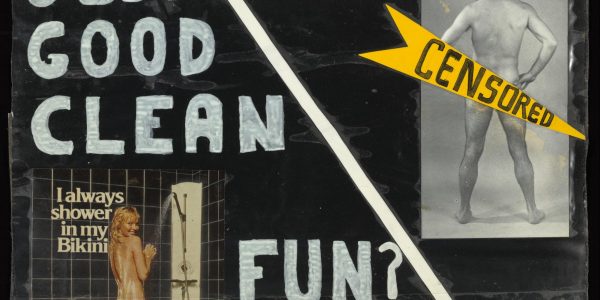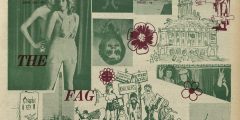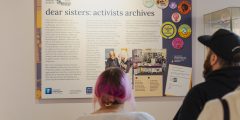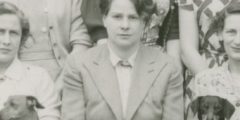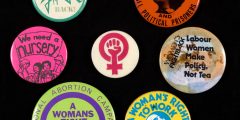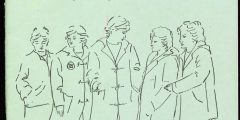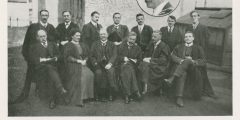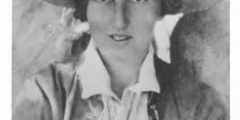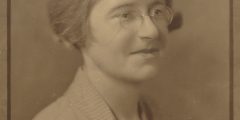Page 3, pin-ups and double standards
July 10, 2024
Tina Pamplin of the Nottingham Feminist Archive Group, and Sarah Colborne, Archivist at the University of Nottingham, introduce a new addition to the East Midlands Feminist Archive: the ‘For Women Only’ calendar which was produced by Lincoln Women’s Action Group. They compare it to a similar occasion in the University’s history when printers refused to …
Uncovering feminism and sexism in the University Archives
May 13, 2024
This is a guest post by Samantha Brinded, who volunteered with Manuscripts and Special Collections between May 2023 and March 2024. For decades, student magazines have played an integral role in university culture, and the University of Nottingham is no exception. In 1939, students established a newspaper called Gongster following on from the campus arts …
dear sisters exhibition opens
April 10, 2024
Manuscripts and Special Collections were delighted to welcome so many people to the launch of the exhibition dear sisters: activists’ archives at the Weston Gallery last month. The exhibition was officially opened by Professor Shearer West, the University of Nottingham’s first female Vice-Chancellor, and Vandna Gohil, CEO of Nottingham’s Women’s Centre. Both spoke of the importance …
Audrey Beecham: Warden, historian, poet, anarchist, feminist, and champion of the underdog
March 1, 2024
Helen Audrey Beecham (1915-1989) came to the University of Nottingham in 1950 having been appointed warden of the newly built Nightingale Hall, which at the time was a women-only hall of residence. She served as warden and also lecturer in social and economic history for 30 years until her retirement in 1980. Before coming …
Advocates for animal welfare: FRAME
February 9, 2024
In our previous blog in this series, ‘Advocates for animal welfare: The Three Rs’, we introduced the ‘The Principles of Humane Technique in Experiments on Animals’ by William M.S. Russell and Rex Burch, which was to have such an impact on the career of Michael Balls, OBE, Emeritus Professor of Medical Cell Biology at the …
Introducing the Feminist Archive (East Midlands)
November 22, 2023
The Nottingham Feminist Archive Group and Manuscripts and Special Collections are delighted to announce the creation of: FME: The Feminist Archive (East Midlands) FPC: The Feminist Publications Collection The two new research collections are the result of a collaboration between the University and local activists who have been contributing their photos, papers and memories for …
The Ken Coates collection – the coal mining industry and its decline in Nottinghamshire
December 14, 2022
This is a guest blog post by Law student Ceyhan Ballioglu, who undertook a placement with Manuscripts and Special Collection in 2022. During the Autumn semester of my second year at the University of Nottingham, I had the opportunity to volunteer at the Manuscripts and Special Collections Department. Here, I was given the chance to …
International Women’s Day: Dr Edith Becket
March 10, 2022
Dr Edith M Beckett (1877-1952) was one of the earliest students of University College, Nottingham, where she obtained a London BA degree in 1898. Unlike some universities, London (and thus by extension University College Nottingham, which did not award its own degrees) allowed female students to earn a degree, rather than simply complete their studies …
International Women’s Day: Dorothy Brett
March 9, 2022
This is a post by ‘Editing DH Lawrence# co-curator, Dr Rebecca Moore. Dorothy Eugénie Brett, born in London in 1883, was an artist of noble birth. Having had drawing lessons since the age of five, she joined the Slade School of Art in 1910, and studied there until 1916 where she became known simply as …
International Women’s Day: Alice Selby
March 8, 2022
A creative, individual and superb teacher, Alice Selby was a force to be reckoned with when she joined University College Nottingham in 1918 after completing her studies at Cambridge University. She was one of only four academic staff in the English Department, and rising to become Senior Lecturer and Head of English. She taught …

